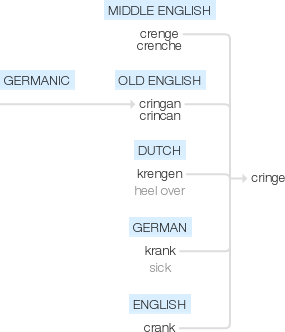Cringe
Middle English crenge, crenche, related to Old English cringan, crincan ‘bend, yield, fall in battle’, of Germanic origin and related to Dutch krengen ‘heel over’ and German krank ‘sick’, also to crank1.
wiktionary
The verb is derived from Middle English crengen(“to bend in a haughty manner; to condescend”)[and other forms], [1] from Old English *crenċan, *crenċġan, *crengan(“to cause to fall or turn”), the causative of crinċġan(“to yield; to cringe; to fall; to die, perish”), [2] from Proto-Germanic *krangijaną(“to cause to fall; to cause to turn”), from Proto-Germanic *kringaną, *krinkaną(“to fall; to turn; to yield”) (from Proto-Indo-European *grenǵʰ-(“to turn”)) + *-janą( suffix forming causatives with the sense ‘to cause to do (the action of the verb)’ from strong verbs). The English word is cognate with Danish krænge(“to turn inside out, evert”), Dutch krengen(“to careen, veer”), Scots crenge, creenge, creinge, crienge(“to cringe; to shrug”), Swedish kränga(“to careen; to heel, lurch; to toss”), and West Frisian kringe(“to pinch; to poke; to push; to insist, urge”); and is a doublet of crinkle.
The noun [3] and adjective are derived from the verb.
etymonline
cringe (v.)
1570s, "to bend or crouch, especially with servility or fear," variant of crenge, crenche "to bend" (c. 1200), from causative of Old English cringan "yield, give way, fall (in battle); become bent," from Proto-Germanic *krank- "bend, curl up" (source also of Old Norse kringr, Dutch kring, German Kring "circle, ring"). Related: Cringed; cringing. As a noun from 1590s. Cringe-worthy (adj.) is attested by 1990.
